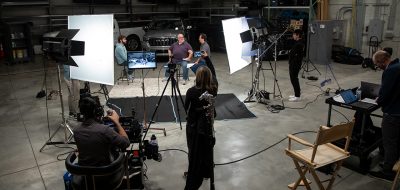Even if you have prepared thoroughly for an online event, you may still encounter various problems. So, in this article, we will introduce some points that you must understand before planning and selecting partners for your online event.
__Table of Contents__
– [Fundamental Differences in the Nature of Online and Offline Events] (#1-)
– [Points to Keep in Mind and Preparations Required for Online Events] (#2-)
– [How to Present in Front of the Camera, Which is Different from Being on Stage] (#3-)
– [Remote Panel Discussions Require Thorough Preparations] (#4-)
– [Problems that are Likely to Occur in Online Events] (#5-)
– [Understand the Problems that are Specific to Online Events and Prepare for Them] (#6-)
## 1. The fundamental differences between online and offline events
In the case of traditional offline events, the speaker would go to the venue on the appointed day and time, have a preliminary meeting, go on stage when it was time, give a presentation and answer questions. However, if you think of online events in the same way, the probability of unexpected problems occurring will increase dramatically compared to offline events.
For example, there are issues such as problems with the filming and distribution system, or the fact that you can’t see the reactions of the audience, so it can be difficult to get a feel for the pace of the event as you speak in front of the camera. These are issues that you can’t avoid when holding an online event. However, if you can anticipate some of the problems in advance, you may not need to worry about them so much. First of all, as a basic premise, you should understand that although there are many similarities between offline and online events, they also have completely different characteristics.
## 2. Points to note and preparations unique to online events
When choosing topics for the keynote speech and breakout sessions (breakout sessions), whether live or on-demand, please consider the fact that it is an online event.
With online events, it is easy to leave with just one click. For this reason, as mentioned in “Time Allocation to Keep in Mind for Online Events” (https://www.brightcove.com/ja/resources/blog/thorough_understanding_of_virtual_events_2), it is better to keep session times short as a way to keep viewers engaged.
Given the premise that the session time will be short, you should consider whether the content you want to convey to the audience can be covered within the time available. The best way to check this is to prepare a schedule (or script) in advance. The idea is that you have a list of topics that you will cover from time to time. Having a schedule will help you to keep the session moving along at a good pace, even if the session time is short, without making the content too thin.
The choice of topics is important, of course, but so too are the materials you prepare. When using materials in an online event, you will generally display the materials you have prepared on the screen. If the text in the materials is too small, the audience will not be able to read what is written on the screen. It is important to create materials with the idea that they will be viewed on a small screen, such as a smartphone. If there are a lot of words and they are small in size, the audience will have to focus on reading the words on the screen. When you put yourself in the audience’s shoes, you need to be more careful than you would for an offline event to make sure that the materials are easy to read on all devices and that the content can be delivered at a good pace.
## 3. How to present in front of the camera is different from being on stage
It is also important to check in advance how much experience the speaker has of giving talks at online events. If they don’t have much experience, it would be better to have them practice talking in front of a camera. Even speakers who are used to giving talks on stage often end up giving monotonous presentations with little inflection, because they are not used to talking to a camera and cannot see the reactions of the audience. At online events, you need to have not only the talk skills you would use on stage at an offline event, but also the skills to talk in front of a camera with an awareness of the online audience.
You also need to be careful about how you handle the Q&A session. At offline events, it’s possible to keep things simple and just call on people to ask questions one at a time within a set time limit. However, at online events, questions will continue to pour in from viewers even outside the Q&A session time through chat and posting functions. In that case, it’s not realistic for the speaker to read and choose questions to answer themselves. As explained in “[Q&A at Online Events is More Exciting than Offline Events!](https://www.brightcove.com/ja/resources/blog/thorough_understanding_of_virtual_events_3)”, it is a good idea to appoint a dedicated person to handle Q&A, and to make preparations in advance to ensure that the event runs smoothly.
## 4. Remote Panel Discussions: The Importance of Advance Preparation
If you are planning to hold a panel discussion, make sure you do the same careful preparation (or rehearsals) as you would for an offline event. In particular, you need to be careful if you have multiple speakers in different locations and you are connecting them remotely. Try to avoid the situation where the speakers are saying “Nice to meet you” for the first time in the actual event. Even if the topic is one that the speakers are familiar with, in a remote environment it is easy for the content of each speaker’s talk to become disconnected, and the session can easily become inconsistent. It would be great if all the speakers were used to online events, or if the moderator had a very high level of skill in connecting the panelists’ stories together and making the session exciting, but it’s not easy to assign people who can act well online. It would be good for the moderator and panelists to meet in advance to discuss the content and flow of the talk, and to rehearse the available time for each theme.
Also, it is important to note that communication between speakers is not the only thing to be careful about. Those taking part in the event should check the lighting and how they will look on screen in advance at a rehearsal. Please be aware that if you have more than three panelists for an online event, they may not all fit on the screen.
## 5. What are the common problems that occur at online events?
Online events like live streaming are bound to have problems. While it is most important to prepare to avoid problems, there is no way to guarantee that everything will go perfectly. It is important to be prepared to deal with problems in a flexible manner, accepting that they will occur. First, let’s introduce some of the problems that could actually occur.
– The internet connection suddenly stops working or becomes unstable
– When displaying materials, an unintended screen is displayed
– Problems with filming or broadcasting equipment
– The image quality is lower than expected
– The font is too small to read the text on the materials
– The audio is playing but the video is not displayed (or vice versa)
To avoid these problems, before the event starts, be sure to double and triple check the quality of the video and audio during the technical rehearsal. We also strongly recommend connecting to the internet using a wired connection rather than a wireless LAN. Even with careful preparation, there is still a risk that problems will occur. It is also important to have redundant (multiple) equipment and systems, and to have a troubleshooting plan in place.
However, as we have said before, it is impossible to reduce the probability of a problem occurring to 0%. It is a good idea to prepare a slide or on-screen message that can be displayed in the event of a problem, such as “There is a technical problem. Please wait a moment”. And, in the event of a problem, make sure that the operation team can switch screens immediately, by checking the operation procedures in advance.
## 6. Be prepared for the unique problems that can occur with online events
I hope you now understand that there are significant differences between offline and online events. It is important to recognize that online events are fundamentally different in nature to offline events. When holding an online event, please be sure to check the points raised in this article in advance.




